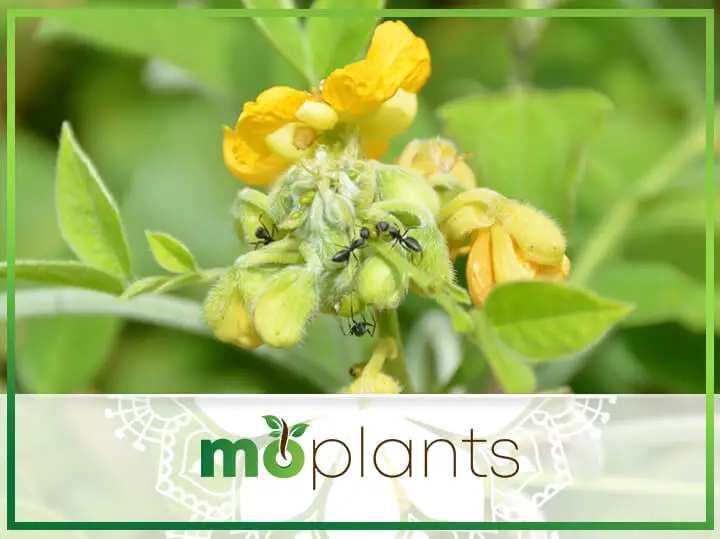Gardening is a fun activity. There is no better feeling in the world than styling up your house with plants and flowers.
Unfortunately, the garden is not spared from occasional visits from those little red pests. Therefore, we have to go over the best plants that repel ants.
Which Plants Are Good for Repelling Ants Away?
Let’s be honest. We hate a pest that enters the home. No one wants an army of ants surrounding houses with potential infections and garden damage.
What needs to be done to avoid ant trails from entering the kitchen doorway or rotting the soil?
This is where plants that repel ants enter the picture. One may think that these herbs are hard to find because of their first-class fragrance and aroma.
Luckily, you do not need to look any further because some of the plants we will feature are accessible in most gardens and flower shops.
Not only are these garden plants great for ant repelling purposes, but they can also serve as cool decorations for the home.
Here are the eight best plants that help keep the home safe from ants and insects:
Mint
Mint is commonly known for eliminating bad breath and germs. However, did you know that this perennial plant can get rid of ants?
You heard that right. Its strong scent will have those insects flying away in seconds. After a year or so, the plant’s growth becomes exponential.
Mint even has health benefits of its own. Insert these leaves in your cup of tea, and you get advantages like rich nutrients, improved brain function, etc.
The best part? Mint plants come in different varieties. If you are the traditional gardener, you will enjoy filling up the garden with leaves such as peppermint and spearmint.
Want to spice up the garden? You can go for plants composed of either pineapple mint or apple mint.
I suggest you start stacking up on mint seeds if you want to deter ants and keep them away from your home.

Thyme
Thyme is often associated with salad thanks to the sweet and pleasant scent it provides the dressing. Therefore, you would think that the kitchen apparatus cannot serve as an ant repellent?
Believe it or not, thyme can also deter ants from entering the soil. It is because the ant repellent plant contains anti-fungal and anti-bacterial properties.
One unique feature over other plants and herbs is its ability to grow without needing too much sunlight.
Its versatility allows it to grow in multiple places such as sidewalk cracks, flower arrangements, the herb garden, you name it.
I encourage you to plant thyme herbs across your hallways to keep your home safe and secure from bugs, ants, and other insects.
For the best results, sprinkle thyme leaves around the house to free more areas from such pests.
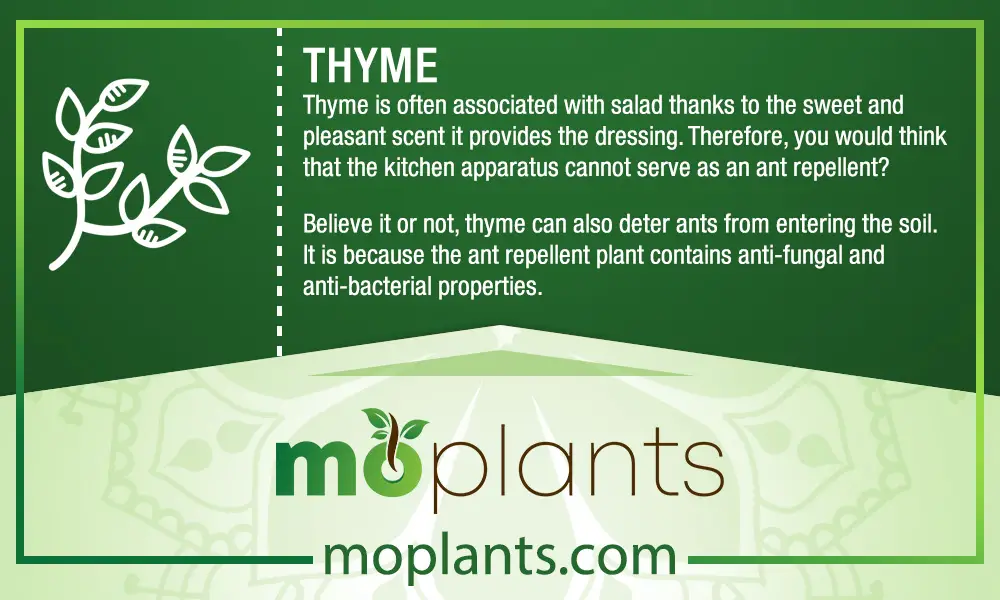
Tansy
Tansy makes the garden fancy. All jokes aside, this ant deterrent elicits a soothing smell and bitter taste. Indeed, tansy is the gardener’s best friend and the insect’s worst enemy.
It is more commonly known as the “Golden Buttons” because of its mound shape, 4-foot stature, and yellow appearance.
Tansy flowers usually bloom during the spring and summer seasons.
For the best results, plant these herbs in any garden or outdoor setting. Medium-sized pots or any container with soil should do the trick.
Moreover, if you want your garden to be surrounded by lots of tansy flowers, make sure not to overwater each herb. Tansy is one of those plants that work best in dry soil.
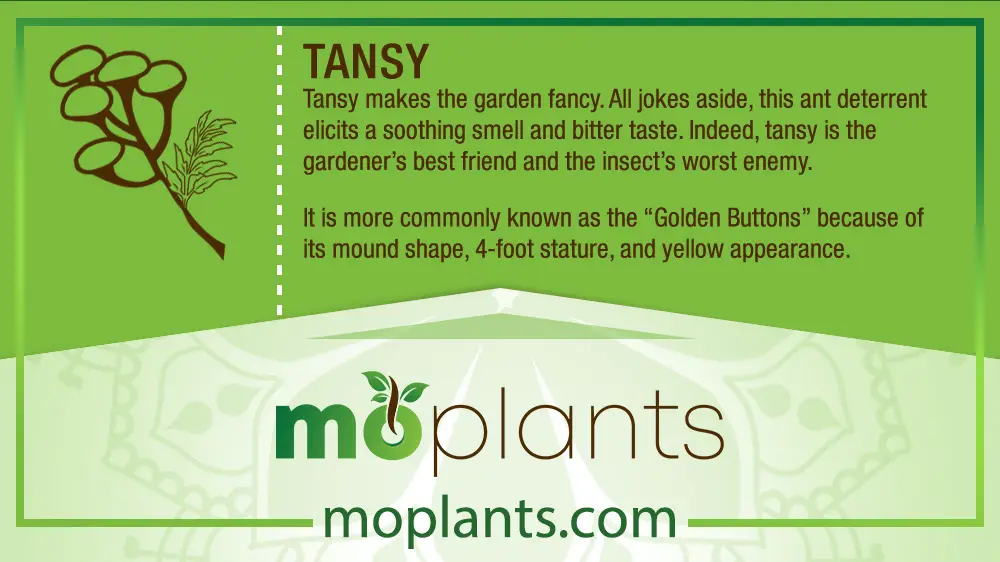
Lemongrass
When life gives you lemons and ants, why not make lemongrass herbs?
Unlike other plants, lemongrass contains citronella oil, an excellent repeller of ants. One way you can use lemongrass is by crushing the plant into smaller bits and leaves.
In doing so, you spread its strong scent around the house, resulting in the ants losing their direction and senses.
Also, its acidic taste can be detrimental to ants. I highly suggest boiling lemongrass extracts overnight so that you can incorporate these with other herbs.
By doing so, the garden gets a significant boost in terms of repelling effect.
Are you looking for alternatives to the perennial plant? Try out Lemongrass oil.
All you have to do is mix a few drops with water, and you have yourself a spray that will repel ants in no time.
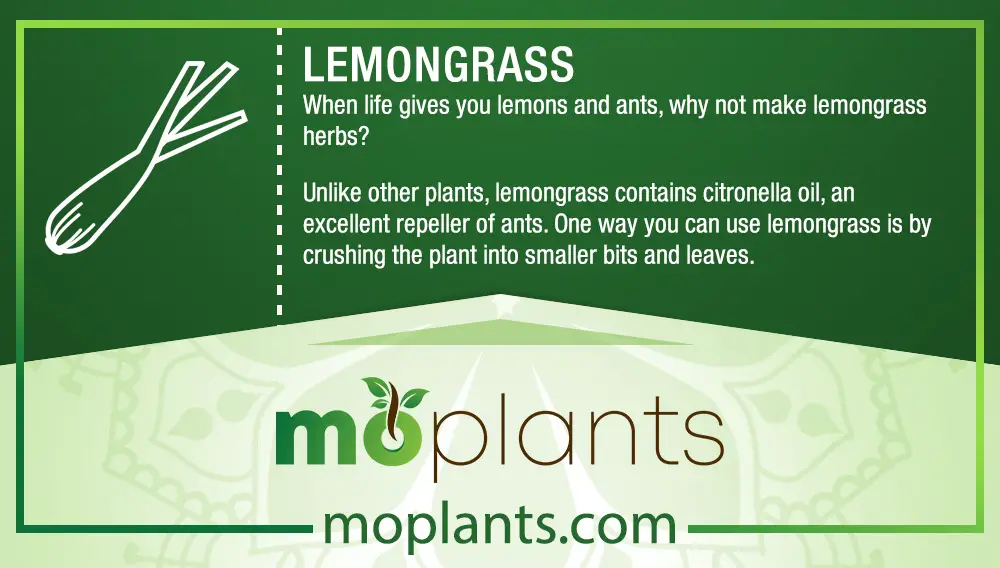
Garlic
Garlic is not just a popular condiment for savory meals. You heard that right.
The kitchen companion is also an excellent plant for pest control. “Why is that?” you may ask.
One can argue that garlic does not have the same scent lavender, mint, and lemongrass possess. However, its strong and unpleasant smell will keep ants away from your garden.
For more enhanced results, mix small garlic cloves with boiling water and place these in a spray bottle. By doing so, the garlic solution will reach little corners and other tiny passages for ants.
Another way to repel ants is by smashing a garlic clove with a mortar and pestle. After that, spread the tiny bits around in various ant trails.
Just be careful when doing this to avoid these from entering your eyes.
Although it is not a house plant, garlic is found all over the grocery stores and markets. If anything, you have up to 600 types to choose from.
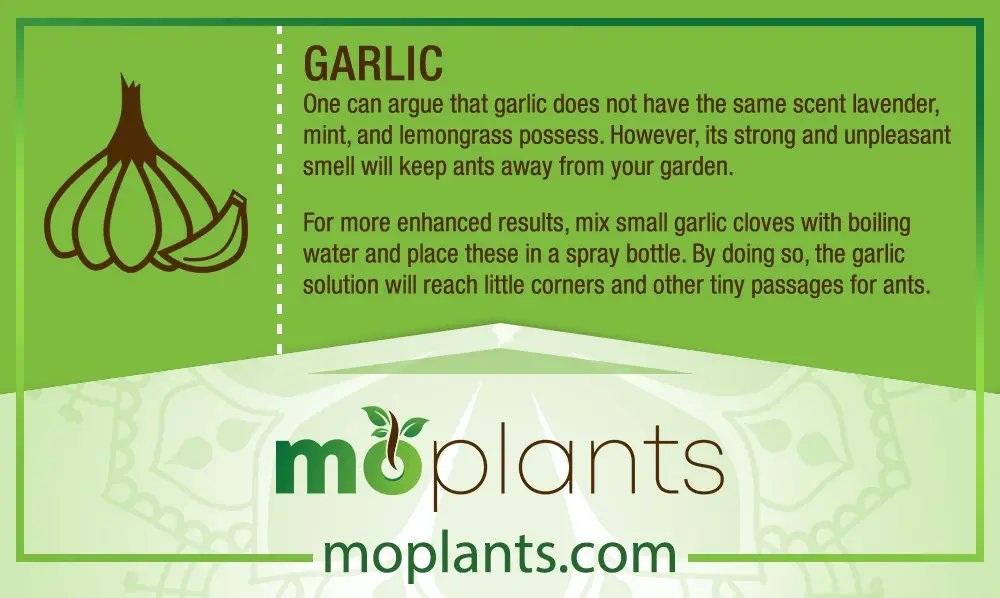
Rosemary
Rosemary holds its own among other repelling plants. It keeps the home warm and cozy with its fragrance and aroma.
With outside exposure, rosemary keeps the soil and garden plants well-protected against ants, mosquitoes, beetles, and other pests.
It does so by disguising the smell of most plants, which repel ants and insects. For better effects, crush the leaves and have them spread out across the garden.
Compared to other plants, rosemary needs to be exposed under direct sunlight for the advantages to take full effect. Avoid placing this plant in the dark corners of your home.
Also, please do not fill the roots with excess water to avoid them from dying.
If you feel too lazy to plant rosemary on your own, rosemary leaves are available in select stores and plant shops.
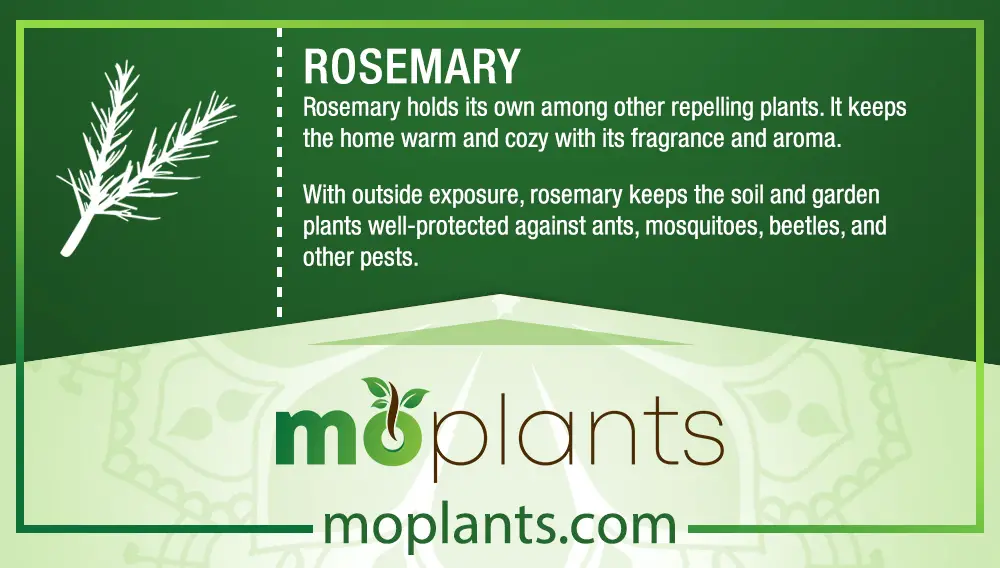
Lavender
Lavender flowers are one of the most beloved flowering plants in the gardening industry.
The self-seeding herb gives off a strong scent that will have ants running for their lives. Surrounding your garden with lavender will help prevent ants from harming other plants.
Are you worried about those bed bugs at night? Put some in your closets and shelves to stop those bugs from entering your bedroom.
One important thing to note is that lavender works if you give it enough airflow and sunlight. It works best in tropical countries or areas with high levels of humidity.
Also, please be careful when applying lavender around the house. Dogs and other pets may be harmed if you use large amounts of the said herb.
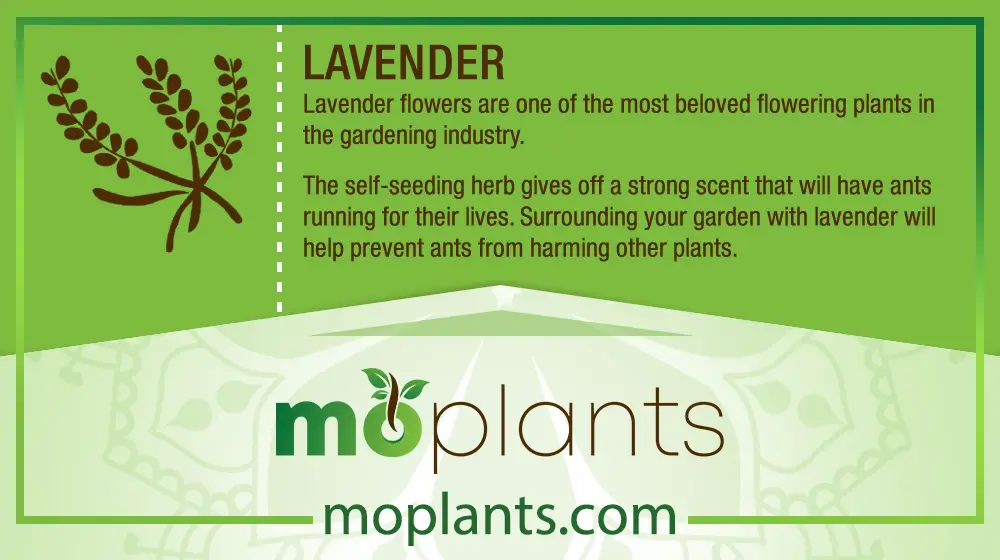
Sage
Sage is another fan favorite in the field of aromatherapy. Its pleasant scent gives a soothing aura for most salon-goers.
It is no secret that sage has become a popular ingredient in various natural essential oils.
These should be more than enough to convince you that the sage plant effectively repels ants and other infectious insects.
Besides protecting the garden, sage oil also shields your skin from insect bites that may develop into illnesses.
Climate-wise, it can operate with soils that have temperature ranges of around 60 to 70 degrees Fahrenheit.
In short, it makes its full presence felt during the summer season and in the tropics.
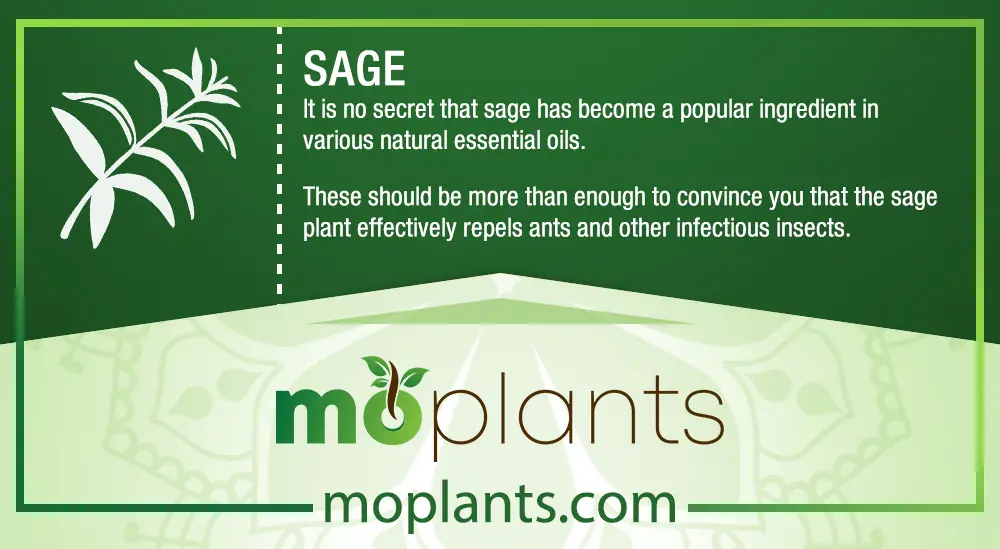
Infographic
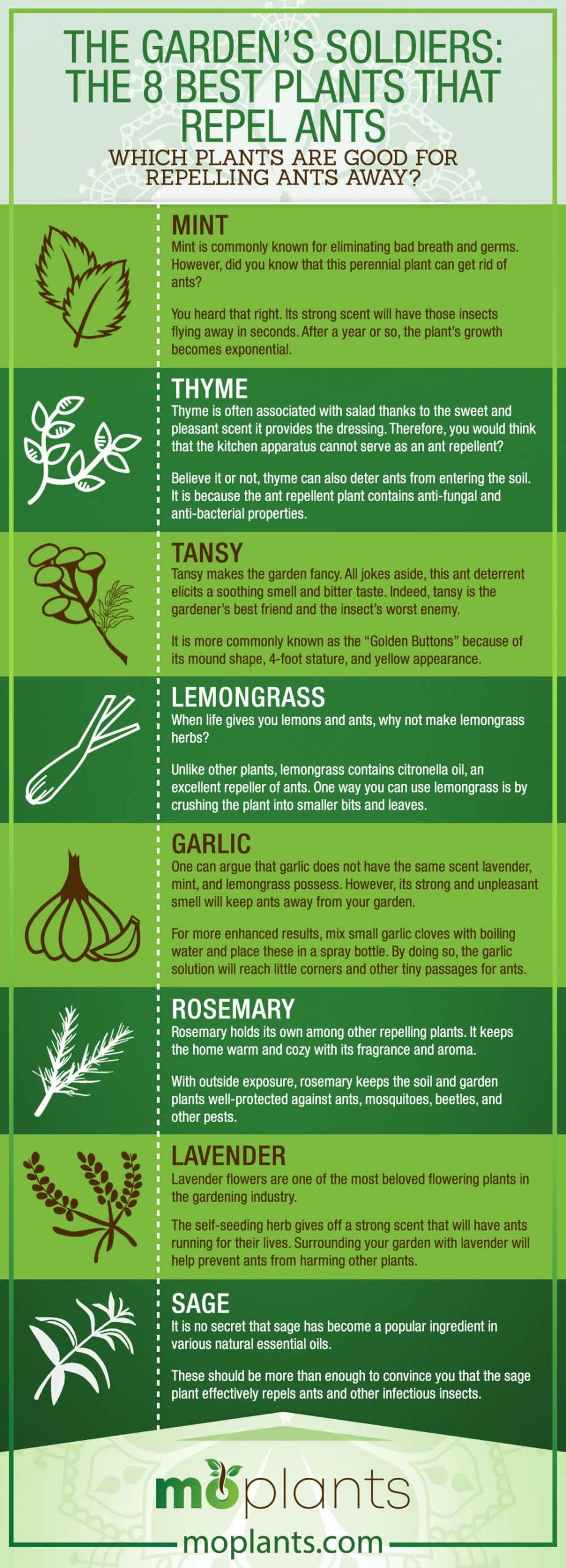
How to Choose Plants That Repel Ants?
Need help picking the best plant for your garden? Are you concerned about not being an expert in gardening?
Fear not because this part of the article will help you select the ideal plant for your home. However, please do understand choosing depends on personal preference.
One may prefer this plant, while others might lean towards that herb. In short, there are no right or wrong choices.
Research on the Ingredients
Even though we gave you a quick rundown on the plants that repel ants, doing extra research will benefit you in the long run.
Some herbs may need more sunlight exposure than others and vice versa. The different plants mentioned may have health benefits or side effects.
I am sure you would like to know more about the facts and personalities of each plant.
You can do these by simply reading multiple reviews, credible sources, and scientific data. Who knows? You might become interested in pursuing the gardening niche.
Ask Other Gardeners and Homeowners for Their Feedback
Besides doing your research, it pays to ask around the neighborhood for their personal experiences and feedback.
It helps to have a secondhand account of other people’s experiences. Hearing personal anecdotes and stories will help gauge your confidence level in each plant type.
It will determine whether some plants are more successful in eliminating ants compared to others.
Be Wary of Potential Allergic Reactions
There are multiple ways in which these plants benefit your home. However, not all of them are free from possible risks and drawbacks.
This is because some herbs may contain ingredients that may cause skin allergies and illnesses.
For example, smelling garlic may cause hives, tingling, vomiting, etc. Some flowers are known for producing pollen allergy.
Therefore, you might experience side effects such as a runny nose, sneezing, and even asthma.
When in doubt, consult your local doctor to determine which plants are suitable for both the garden and your health.
Choose Budget-Friendly Plants
First and foremost, choose a plant that satisfies your budget. While it is essential to keep ants away, managing the house requires you to balance the expenses.
Therefore, pick those that are not too pricey. Go for the ones that offer you maximum value for money. Fortunately, all the featured plants fulfill their primary role of repelling ants.
However, there may be some that have more benefits over others. It would be great if you can go for cost-effective plants that save you a couple of dollars.
Improve Your Home and Mental Health
Last but not least, enjoy giving the garden a makeover. Although the whole point of gardening is to keep ants away from home, it won’t mean much if you are not having fun.
Believe it or not, gardening reduces stress and improves your overall mental well-being. Furthermore, it boosts your ability to focus and interact with your assigned tasks.
Indeed, gardening is suitable for both the house and your soul.
Conclusion
I hope you enjoyed going over the best plants that help get rid of ants and other garden pests. Don’t forget to wear gloves to keep ants, soil, and other toxins away from your hands.
May you choose the plant that best suits your home and satisfies your needs. As mentioned earlier, these ingredients are accessible all over town, from your kitchen to the marketplace.
Did you like our plant selections? Feel free to comment and contact us for more inquiries.

